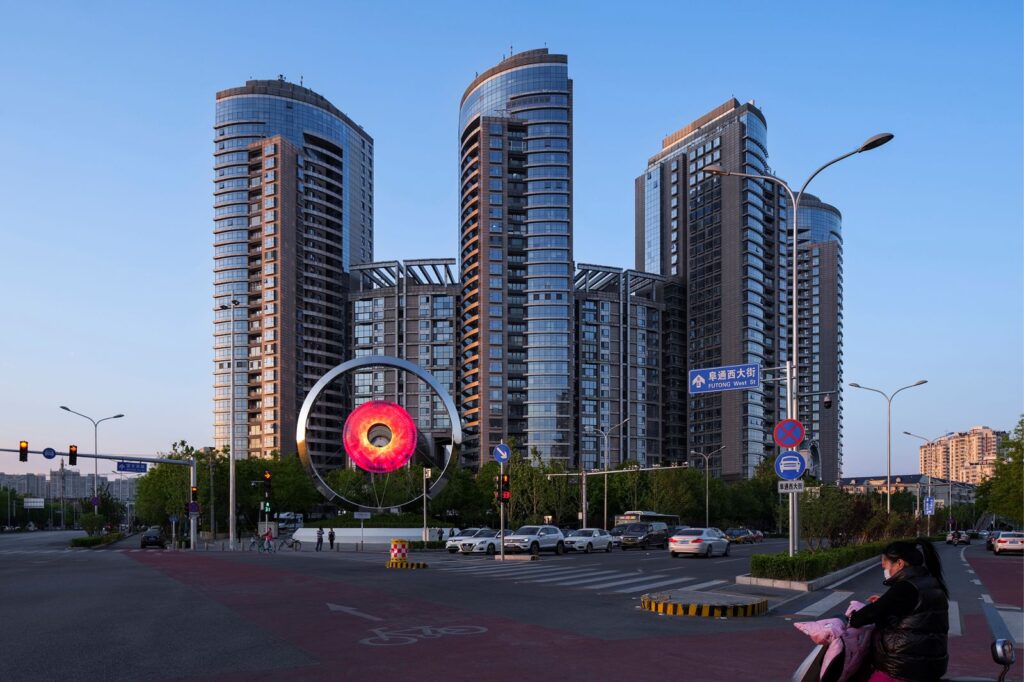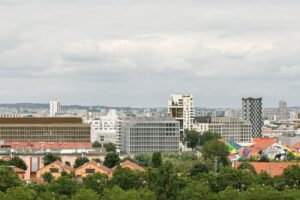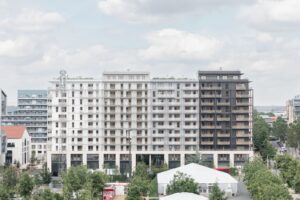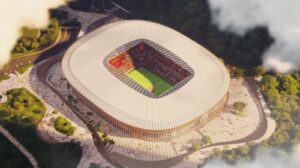Colorful Wangjing by Hu Quanchun

The sculpture Colorful Wangjing is a new landmark created for Wangjing Sub-district in Beijing. It is located at the junction of Wangjing West Road and Futong West Avenue, which is a main intersection towards the downtown of Wangjing and is also an urban gateway.
Wangjing was once vast farmland in the northeast of Beijing. But the nearly 20-year rapid development has turned it into a comprehensive and international area that integrates international affairs and business, mobile internet technology zones, fashion, living and social activities, by taking advantage of its favorable location, transportation, technology, fashion, livability and international business environment.
In such a context, the project is intended to create a landmark to identify an urban gateway and to exemplify the spirit of this international new area. The concept and form of the landmark sculpture are derived from the modern interpretation and expression of “Wangjing”, a place name that can date back to ancient times.
“Wangjing” literally means “look out to the imperial city”, implying that the imperial city is visible in this area, and thus it represents a strong identity of space and direction. What’s more, from the satellite map, the extension of Wangjing Road next to the sculpture can reach Tian’anmen Square and hence the new landmark inherits the ancient meaning of “looking out to the imperial city”.
To echo this, the design adopts an abstract image of an “eye” as the basic form of the landmark sculpture. And this is also the reason why citizens name it “The Eye of Wangjing” after its completion. The design tries to communicate rich city context in a minimalist form, and to create a piece of public art that turns into a city landmark while harmonizing with future development and daily life.
The outer circle of the sculpture, with a diameter of 18 meters and made of stainless steel, holds the inner circle— a hyperboloid LED screen through steel cables, together forming a simple form of an “eye”.
The outer circle is built with mirrored stainless steel to integrate the main structure into the environment, and the steel cables add a sense of suspension and mystery to the central “pupil”. Among the three basic elements, the hyperboloid LED screen (i.e. the “pupil”) is the key.
It reflects the richness and significance of the work, as the screen can display various contents to create a brilliant visual effect that everything is in this “eye”. It also highlights interaction as the contents are created by artists and the citizens together.
The idea is to invite various artists to create multi-media artworks relevant to the daily life of the citizens based on different times of the day, different seasons, festivals and major activities, to showcase the diversity, inclusiveness and colorfulness of Wangjing in its spirit and characteristics.
Therefore, the sculpture is not only an urban landmark, but also an open multi-media art display window that interacts with the public and displays the spirit and ethos of Wangjing in real time. The sculpture stimulates an inconspicuous small square at the junction of Wangjing West Road and Futong West Avenue, and creates a constantly changing context for daily entertainment and communication.
It is designed for Wangjing, and more importantly, for its people. At the very beginning, the design considered creating a new visual highlight for Wangjing while minimizing its impacts on the surrounding commercial and residential environment and transportation.
To that end, light sensors are added to the LED screen, which can auto-adjust brightness according to the light conditions at different times throughout the day. Besides, the front and rear sides of the LED screen can work separately to minimize the interference with the nearby residential communities at night. Source by Field Conforming Studio.
Location: the junction of Wangjing West Road and Futong West Avenue, Beijing, China
Architect: Field Conforming Studio
Chief designer: Hu Quanchun
Project coordination: Sculpture Department of Central Academy of Fine Arts
Art instruction: Zhang Wei (Professor at the Sculpture Department of Central Academy of Fine Arts)
Design team: Yuan Hang, Xiang Yu, Chen Songlin, Lu Bowen, Guo Chunzhi
Technical consultant: Mao Qinghu
Structure design: Liu Lijie
LED technical consultant: Jiao Zhibao
Construction: Beijing Jingzhi Culture & Art Co., Ltd.
Commissioner: Wangjing Sub-district Office, Chaoyang District People’s Government of Beijing Municipality
Materials: Mirrored stainless steel, hyperboloid LED screen, steel cable
Size: The main body in a diameter of 18 meters and the hyperboloid LED screen in a diameter of 9 meters
Completion time: October 2022
Photographs: Jin Weiqi, Courtesy of Field Conforming Studio





